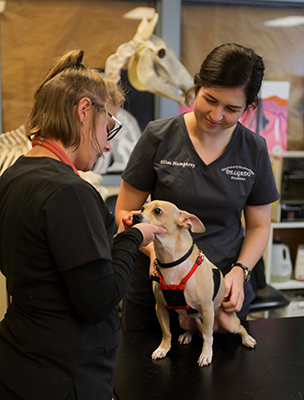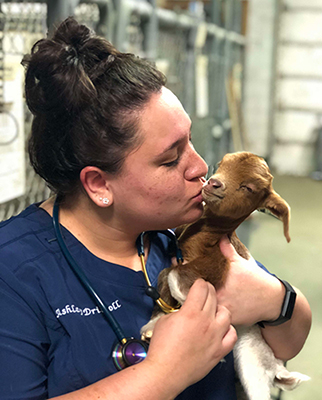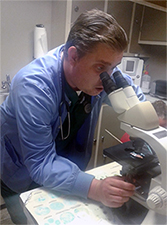Header Two
Veterinary Program Frequently Asked Questions
- Skip to FAQs for Veterinary Assistant -
What is a Veterinary Technician?
 Veterinary technicians are skilled professionals who are vital members of the Veterinary
Health Care Team. Veterinary technicians perform many important duties in a veterinary
hospital or clinic, including the following:
Veterinary technicians are skilled professionals who are vital members of the Veterinary
Health Care Team. Veterinary technicians perform many important duties in a veterinary
hospital or clinic, including the following:
- Client education
- Performing a variety of animal nursing skills
- Performing diagnostic laboratory tests such as blood work, urinalysis and x-rays
- Taking x-rays
- Administering anesthesia and assisting in surgery
- Record keeping
What are the career opportunities for a Veterinary Technician?
The Veterinary Technician profession offers opportunities to work in a variety of settings such as animal hospitals and clinics, medical research, military service/government work, humane organizations, pharmaceutical companies, zoos, and personal ownership of pet stores, boarding kennels and grooming salons. Students may also continue their education by obtaining a Bachelor degree at a 4 year college and becoming a Veterinary Technologist. Additionally specialties exist in Veterinary Technology. Please see the National Association for Veterinary Technicians in America website for more details.
What is the program mission statement?
The mission of the Veterinary Technology Program is to develop veterinary technicians that have both excellent technical skills as well as excellent people skills.
What type of person will make an excellent Veterinary Technician?
If a student loves animals and is willing to work hard, he/she can become an excellent veterinary technician. Other important qualities include a passion for excellence as well as a willingness to work as a team member on the veterinary health care team. People skills are necessary as veterinary technicians must communicate with clients in order to effectively assist patients. Please see the NAVTA website for more information on the profession.
What is the Veterinary Technology Program like at Delgado?
 The Delgado Veterinary Technology Program provides students with a high quality fundamental
and practical education in both the college classroom and veterinary clinical settings.
Students attend lecture classes and some of the laboratory classes at the Delgado
City Park Campus. Students practice many of their learned clinical skills in local
veterinary and animal facilities. Students also are placed into two different externships
during their time in the Program. These externships give them a variety of veterinary
practice settings to work in, as well as opportunities to work in locations that work
with animals such as the zoo, animal shelters, and research facilities. Each of the
externships lasts 150-200 hours during a semester, and provides the student with broad
exposure to various settings working with animals. The locations for externships are
selected by the students with the help of the Program Clinical Coordinator.
The Delgado Veterinary Technology Program provides students with a high quality fundamental
and practical education in both the college classroom and veterinary clinical settings.
Students attend lecture classes and some of the laboratory classes at the Delgado
City Park Campus. Students practice many of their learned clinical skills in local
veterinary and animal facilities. Students also are placed into two different externships
during their time in the Program. These externships give them a variety of veterinary
practice settings to work in, as well as opportunities to work in locations that work
with animals such as the zoo, animal shelters, and research facilities. Each of the
externships lasts 150-200 hours during a semester, and provides the student with broad
exposure to various settings working with animals. The locations for externships are
selected by the students with the help of the Program Clinical Coordinator.
How and when do you apply for admission to the Program?
Delgado Community College is an open admissions college; however acceptance into the Program is by selection. To be eligible to apply for admission to the Program students must:
- Provide evidence of a high school diploma or equivalent.
- Successfully complete all prerequisite general education courses. (See curriculum)
- Earn a cumulative grade point average (GPA) of at least 2.0 in all college courses. Earn a cumulative college grade point average (GPA) of at least 2.0. It is recommended that students maintain at least a 2.8 GPA in order to be competitive with other applicants
- Love animals and be willing to work hard.
- Complete 50 hours of clinical observation at one veterinary hospital (Hours completed within the last two years are acceptable; hours must be completed at a veterinary hospital and completed at one facility)
If you are transferring from another Vet Tech Program please submit an application with all transcripts and course descriptions for the Program Director to review (often students enrolled in other Programs have to start from the beginning due to the difference in how each Program is set up).
How do you find out if courses you have taken at other schools will transfer to Delgado?
To find out if courses you have taken will transfer to Delgado Community College, call 504-671-5651 and for information on meeting with an Allied Health Advisor to have your transcripts evaluated. It is strongly advised that you meet with the advisor at least one semester prior to applying to the Program. If you are currently enrolled in college courses at a college or university other than Delgado Community College, you MUST list the courses you are currently enrolled in and have an official copy of your final grades sent to the admissions office as soon as possible. You must also complete a Delgado Community College Application.

“ I'm using my G.I. Bill to become a Veterinary Technician at Delgado Community College. After being out of school for many years, this is giving me the chance to do something completely different. "
Jason Johnson - Vet Tech Student
What should you do to get more information on the Program?
To get more information on the Veterinary Technician profession or on the Veterinary Technology Program here at Delgado, please contact the Program Director, Jennifer Limon EdD, RVT. You may reach her at 504-671-6782, or jlimon@dcc.edu.
If you wish to apply for the Program, please contact the Allied Health Admissions Office for a current complete Information and Application Packet, or obtain the application online and submit to the Allied Health Admissions Office. You may reach them by calling 504-671-5651.
What are the program costs?
Veterinary Technology students pay the same fee for each term as other credit students enrolled in the college. To view the current tuition and fee rates, view the tuition and fees page of the college catalog
Note: The veterinary technician program requires 65 credit hours of study.
In addition to the tuition and fees, other approximate costs for the Veterinary Technician program include:
- Textbooks - $350 per semester for vet tech
- Medical Supplies Kit - $110
- Uniforms (scrubs, shoes, lab coat) - $200.00
- Health Requirements (tetanus and pre-exposure rabies vaccinations, background check/drug tests) - $110 plus dependent on medical insurance
- VTNE/State exam - $400 included in VETT251 course fees (See the American Association of Veterinary State Boards website).
- Louisiana State License - $100 plus notary fee (See the Louisiana Board of Veterinary Medicine website).
What is the difference between a Veterinary Technician and Veterinary Assistant?
Both are important members of the healthcare team. Veterinary assistants complete a 2 semester certificate, with the option of becoming an Approved Veterinary Assistant, while Veterinary Technicians complete a 5 semester AAS degree and are credentials as Registered Veterinary Technicians. Veterinary Technicians learn more in depth information regarding nursing and patient care and are able to perform more advanced skills such as IV catheter placement, blood draws, assisting in surgery, taking x-rays, administering anesthesia, and client education, while Veterinary Assistants perform skills such as patient restraint, filling prescriptions. sterilizing instruments, and assisting with x-rays. Both have opportunities for advanced education as the Veterinary Assistant can continue to become a Veterinary Technician and the Veterinary Technicians can continue to become a Veterinary Technologist with a 4 year degree. Veterinary Technicians also are in a higher salary range.
View the Salary range for Veterinary Technicians
View the Salary range for Veterinary Assistant
What is a Veterinary Assistant?
Veterinary assistants are skilled professionals who are vital members of the Veterinary Health Care Team. Veterinary assistants perform many important duties in a veterinary hospital or clinic, including the following:
- Restraining animals
- Cleaning surgical instruments
- Filling prescriptions
- Assisting with x-rays
- Record keeping
What are the career opportunities for a Veterinary Assistants?
The Veterinary Assistant profession offers opportunities to work in a variety of settings such as animal hospitals and clinics, humane organizations, boarding kennels and grooming salons. Students may also continue their education by obtaining an Associate degree (offered at Delgado) and becoming a Veterinary Technician. Please see the National Association for Veterinary Technicians in America website for more details.
What type of person will make an excellent Veterinary Assistant?
If a student loves animals and is willing to work hard, he/she can become an excellent veterinary assistant. Other important qualities include a passion for excellence as well as a willingness to work as a team member on the veterinary health care team. People skills are necessary as veterinary assistants must communicate with clients and other team members. Please see the NAVTA website for more information on the profession.
What is the Veterinary Assistant Program like at Delgado?
The Delgado Veterinary Assistant Program provides students with a high quality fundamental and practical education in both the college classroom and veterinary clinical setting. Students attend lecture classes at the Delgado City Park Campus. Students practice many of their learned clinical skills in local veterinary and animal facilities during their externship. The externship gives them a variety of veterinary practice settings to work in. The externship provides the student with broad exposure to various settings working with animals.
How and when do you apply for admission to the Program?
Delgado Community College is an open admissions college; however acceptance into the Program is by selection. To be eligible to apply for admission to the Program students must:
- Provide evidence of a high school diploma or equivalent.
- Successfully complete VETT101 and VETT103.
- Earn a cumulative grade point average (GPA) of at least 2.0 in all college courses.
- Love animals and be willing to work hard.
How do you find out if courses you have taken at other schools will transfer to Delgado?
If you have taken VETT courses in other AVMA accredited Programs, please submit an application online, and click transfer VETT student, then submit the courses descriptions and transcripts for each course taken. Additionally, hands-on skills lists must be submitted for any course taken in order to be reviewed for credit. Once submitted, everything be reviewed by the Program Director. Please note the student must join the Veterinary Technology cohort and cannot choose to take a few classes. All courses are only offered once a year. Please note all general education prerequisite courses must be reviewed by the Allied Health advisor Gloria Baudouin. You may reach her at 504-671-5651. Prerequisite courses must be completed for transfer students from other VETT Programs as well. For questions, please email Dr Jennifer Limon at jlmon@dcc.edu.
What should you do to get more information on the Program?
To get more information on the Veterinary Assistant profession or on the Veterinary Assistant Program here at Delgado, please contact the Program Director, Jennifer Limon EdD, RVT. You may reach her at 504-671-6782, or jlimon@dcc.edu.
You can submit your application online through the Program webpage.
Where is the program located?
City Park Campus, Building 4, Room 112
What are the program costs?
Veterinary Assistant students pay the same fee for each term as other credit students enrolled in the college. To view the current tuition and fee rates, view the tuition and fees page of the college catalog
Note: The Veterinary Assistant program requires 20 credit hours of study.
In addition to the tuition and fees, other approximate costs for the Veterinary Assistant program include:
- Textbooks - $250/semester
- Stethoscope - $50-$100
- Uniforms (scrubs, shoes, lab coat) - $150.00
- Health Requirements (tetanus, background check/drug tests) - $110+ depending on insurance
- NAVTA certification Exam - $100.00 (See the NAVTA website)
